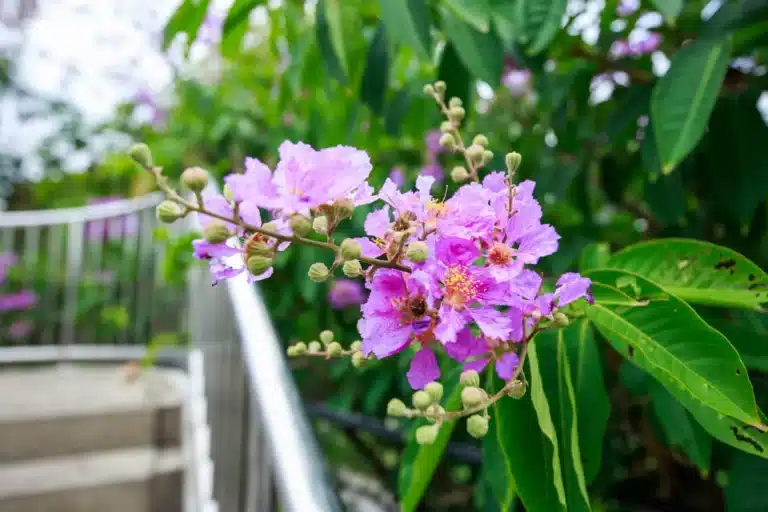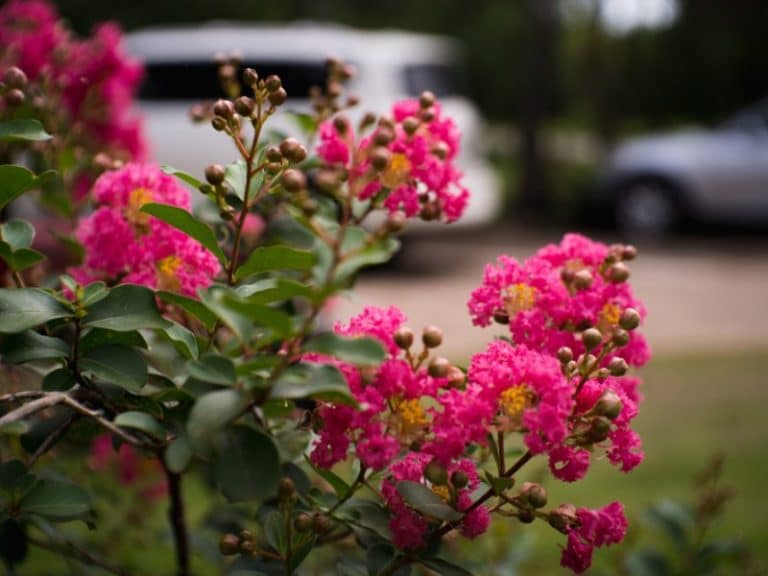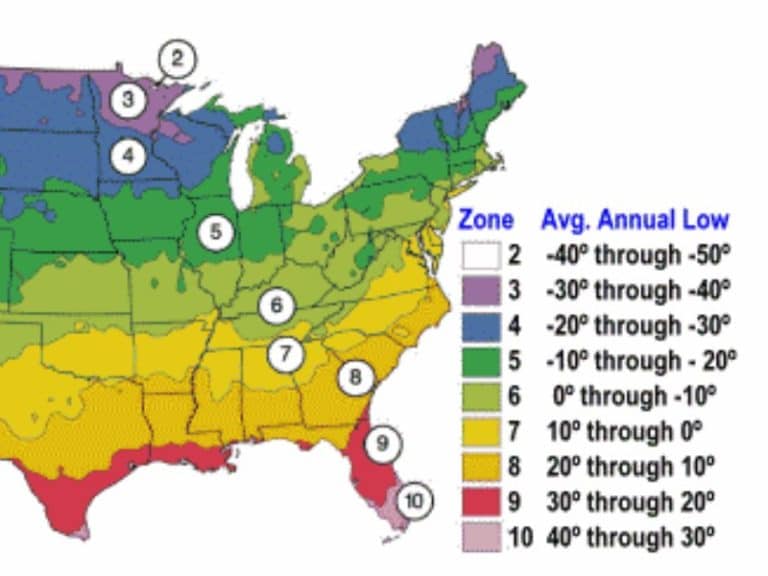What is the Best Fertilizer for Crape Myrtles?
Crape Myrtles are low-maintenance. However, you still have to follow a few rules to make them pop and be at their most flowery. Apart from sunlight, water, and a proper pH, they also need the right amount of a well-balanced fertilizer to thrive. You can use all-purpose fertilizers or crape myrtles-specific fertilizers according to the plant’s needs.
Carl pools crape myrtles plant food and Nelson crape myrtles plant food are some of the best fertilizers formulated for crape myrtles. Osmocote smart-release plant food, Miracle-gro plant food, and Scotts flowering tree and shrub plant food are also great fertilizers that encourage blooming in crape myrtles.
What nutrients do crape myrtles need?
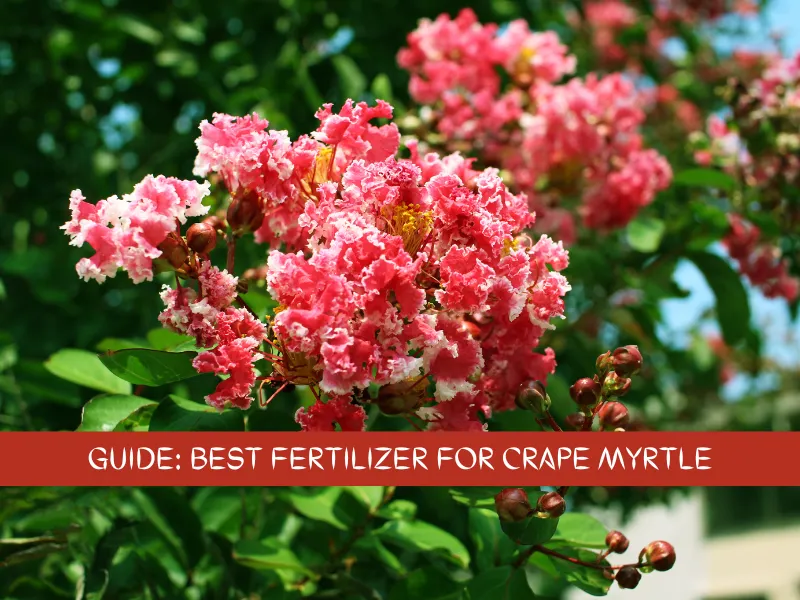
Crape myrtles need a range of nutrients, including the three essential macronutrients, nitrogen, phosphorus, and potassium. Crape myrtles need nitrogen to produce chlorophyll for photosynthesis. Potassium enhances the drought and disease resistance of the plant, while phosphorus encourages root growth and flower and fruit development.
They need correct fertilization to keep blooming for the three months during summer.
Crape myrtles require a relatively balanced N-P-K ratio such as 8-8-8, 10-10-10 at a rate of 1-2 pounds per 1000 square feet.
Too much fertilizer will result in more foliage than flowers. It can also cause the flowers to wilt and dry at the tips. If the fertilizer contains too much nitrogen, it can prevent the plant from blooming.
Perform a soil test determining the nutrient requirements for more advanced fertilization guidelines.
Maintaining a slightly acidic 5.0-6.5 pH is vital for the plant to benefit from the available nutrients.
5 Best Fertilizers for Crape Myrtles
With the many fertilizer options in the market right now, choosing the best fertilizer for your crape myrtles can be challenging. The best fertilizer for crape myrtles should be low-nitrogen and high-phosphorus timely released fertilizer.
Here’s a list of quick go-to fertilizer options for your crape myrtles:
1. Carl Pools Crape Myrtles Plant Food
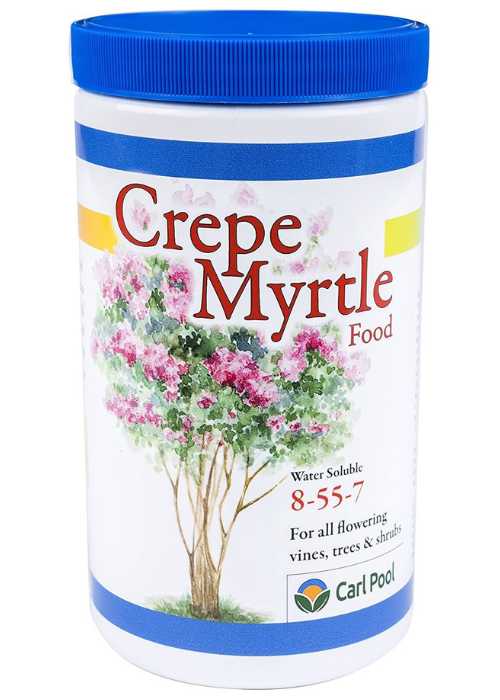
Carl Pools is one of the most preferred crape myrtles fertilizers. It has a phosphorus-rich N-P-K ratio of 8-55-7. While the phosphorus component may be considered too much, it is specially formulated for crape myrtle. Other micronutrients include Magnesium 0.50%, Copper 0.05%, Iron 0.18%, Manganese 0.05%, Zinc 0.11%.
Carl pools plant food is beneficial for plants that have trouble blooming. It has more phosphorus crucial for flower development than standard fertilizers. You will need to test your soil first to determine if it needs extra phosphorus.
Dissolve a tablespoon of the fertilizer into a gallon of water to apply. Apply the solution to your crape myrtle plant after pruning or at any other desired time.
Carl pool crepe myrtles plant food is an affordable product available in grower stores and online outlets.
2. Nelson Nutristar 10-15-9 Crepe Myrtles Plant Food.
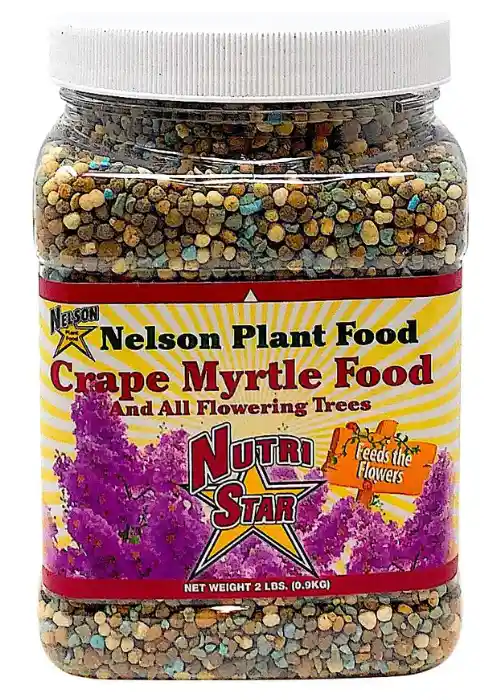
Nelson Crape myrtles plant food is another specialized fertilizer for crape myrtles. It contains the three primary nutrients, N-P-K, at a ratio of 10-15-9. It also has moderate secondary nutrients such as magnesium 2%, Sulfur 9%, Copper 0.05%, Iron 2.20%, Manganese 0.25%, Zinc 0.12%.
It’s recommended you apply this slow-release fertilizer during spring at full rate. However, follow-up applications should be every 60 days at half rate.
The additional sulfur lowers soil pH since crape myrtles prefer slightly acidic soils.
Nelson plant food has four sources of nitrogen and delivers nutrients in approximately four months.
It has a special Nutristar formula that improves stem strength and promotes blooming. It also has biosolids that organically improve the soil quality.
To apply this fertilizer, punch holes into the ground 24 inches apart. Add the fertilizer to the holes and water as instructed.
3. Osmocote Smart-Release Plant Food
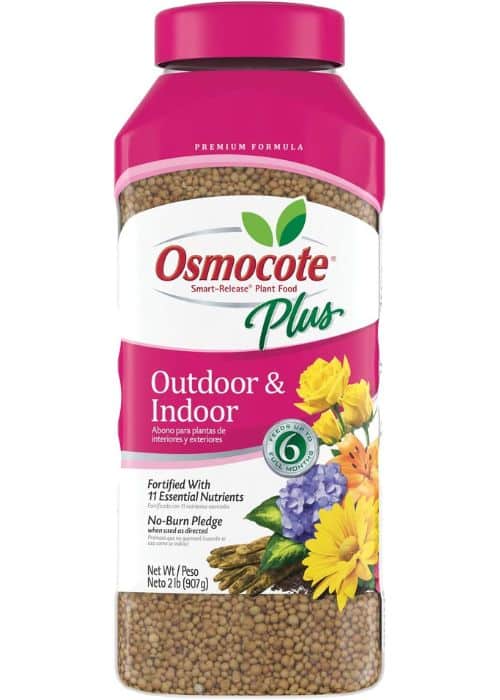
Osmocote smart-release plant food has a balanced N-P-K 14-14-14 ratio, which helps promote abundant blooms. It’s specially made for vegetables and flowering plants such as crape myrtles. It promotes strong root development and colorful flowers.
It is also a slow-release fertilizer that can last up to four months. Because it’s granular plant food, it should be spread at the base of the plant and mixed with the soil.
Osmocote has a water-soluble coating that dissolves and releases nutrients into the soil.
To apply, mix the one scoopful per 4 feet with the 1-3 inches of the soil. Water regularly after mixing.
4. Miracle-Gro Plant Food
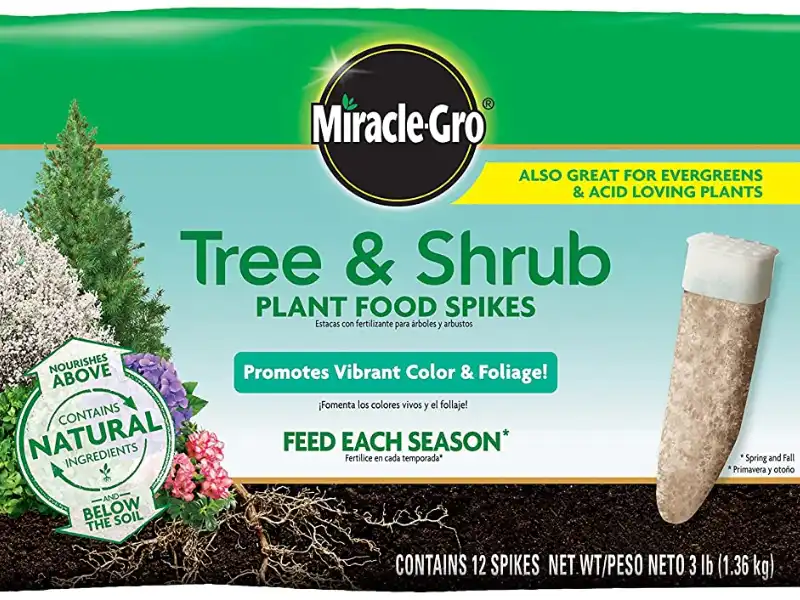
Miracle-Gro Shake and Feed plant food is suitable for mature growing crape myrtles. It is considered the best fertilizer for applying at the beginning of the growing season. Miracle-gro Shake and Feed plant food helps crape myrtles maintain lush foliage and colorful blooms.
The fertilizer’s 18-6-12 N-P-K ratio provides all the required nutrients to your crape myrtles.
On the other hand, Miracle-gro shrub and tree plant food spikes are good for small and potted crape myrtle plants. This fertilizer has a 15-5-10 N-P-K ratio, suitable for promoting vibrant color and lush foliage of young crape myrtles.
It is also essential in protecting the plant against diseases. You should apply this fertilizer every season in spring and fall.
5. Scotts Evergreen Flowering Tree & Shrub Continuous Release Plant Food
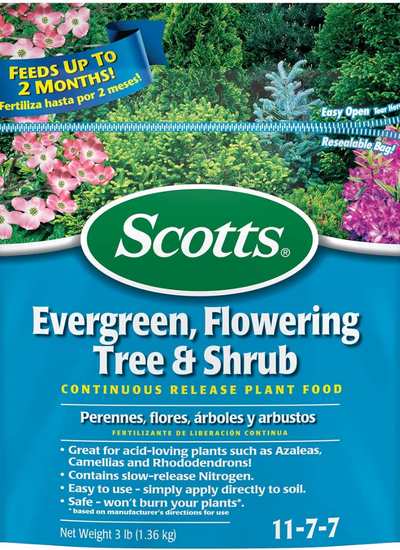
Scotts fertilizer encourages extensive root development and abundant foliage in crape myrtles plants as a continuous release, all-purpose fertilizer.
It is a high-quality fertilizer with an 11-7-7 N-P-K ratio. It also adds 2% sulfur that acidifies soil pH to make it more conducive for crape myrtles and other acid-loving trees.
Some of the nitrogen is released instantly into the soil, while other nutrients such as urea, sulfur-coated urea, potassium chloride & ammonium phosphate are released slowly over two months.
Apply the granules directly to the soil and use a rake or spreader to spread on the 1-3 inches of topsoil. The fertilizer will feed the plant for up to 2 months, and you can reapply if necessary.
Organic Fertilizers
Organic fertilizers containing Nitrogen, Phosphorus, and Potassium are an excellent fertilizer alternative for enriching crape myrtles. Most organic fertilizers are made of animal and plant products such as compost, fishmeal, bone meal, manure, and other natural materials.
Organic fertilizers suitable for crape myrtles include.
1. Espoma Garden Food General Purpose Fertilizer
This is one of the best organic fertilizers for crape myrtles. It contains immediate nitrogen and slow-release nitrogen for long-term feeding. Espoma Garden food fertilizer also contains micronutrients such as manganese, iron, and sodium.
2. Burpee Organic Bone Meal
Burpee organic bone meal is an OMRI-listed organic fertilizer for potted crape myrtles and DIY gardening. It’s a slow-release fertilizer rich in calcium and with a 6-8-0 N-P-K ratio. It would be an ideal fertilizer for young crape myrtles since it promotes root development, foliage growth, and blooming.
3. Espoma Holly-Tone Fertilizer
It is one of the best organic fertilizers for crape myrtles. It contains organic compounds such as feather meal, alfalfa meal, bone meal, sulfate of potash, and elemental sulfur.
Espoma Holly-tone fertilizer is a slow-release long-lasting fertilizer that promotes vigorous growth and flowering in crape myrtles. It is enriched with exclusive bio-tone microbes.
With a 4-3-4 N-P-K ratio, it is a balanced fertilizer that is an excellent choice for plants that prefer acidic soil.
Sprinkle the recommended amount on crape myrtles and water thoroughly. Use one cup per foot of drip line diameter of the plant in spring and late fall.
4. Dr. Earth Organic Fertilizer
Dr. Earth organic fertilizers are a range of fertilizers suited for different purposes. The best Dr. Earth organic fertilizer option for crape myrtles would be Dr. Earth Organic And Natural Nitrogen All Purpose Fertilizer 5-0-2 or Dr. Earth Organic & Natural Acid Lovers Plant Food, 3-4-3 Fertilizer.
Dr. Earth Organic & Natural Acid Lovers Plant Food, 3-4-3 Fertilizer has a 3-4-3 N-P-K ratio and TruBiotic blend of beneficial soil microbes. It is specially formulated to promote exceptional crape myrtle blooms and foliage.
Dr. Earth fertilizer contains alfalfa meal, fishbone meal, feather meal, bone meal, potassium sulfate, kelp meal, and kelp flour.
When should I fertilize crape myrtles?
Young plants need more fertilization to promote root development.
The best time to fertilize the crape myrtle trees is at the beginning of spring or late winter before new growth appears. Fertilize every two weeks lightly to encourage growth throughout the summer and spring. You can also add another dose of high phosphorus in late spring or early spring to encourage flowering.
Young crape myrtles that have just been brought from the nursery should be fertilized monthly throughout the year. Stop fertilization later in the fall or two weeks before the frost date in your area. Stopping fertilization hardens the plant in preparation for winter.
Furthermore, you can stop watering crape myrtles at this time to prevent excessive water retention and root rot.
Water the plant after fertilizing with 1-2 inches of water around the roots to release the nutrients into the soil.
Is Epsom salt good for crape myrtles?
Epsom salt can be a great addition to the soil in which crape myrtles are planted. It is, however, only suitable if the soil is alkaline. You’ll need to perform a soil test to know if the soil is excessively alkaline.
Apply Epsom salts only when the soil pH is greater than 6.5. Typically, Epsom salt is used as a magnesium supplement because it contains magnesium sulfate. Additionally, it also gives the soil more oxygen and sulfur.
To apply, mix the salt with water per the manufacturer’s directions and pour it into the tree’s base. Water immediately with some plain water.
Avoid applying Epsom on the soil unless necessary to prevent mineral contamination and inhibition of calcium uptake.


